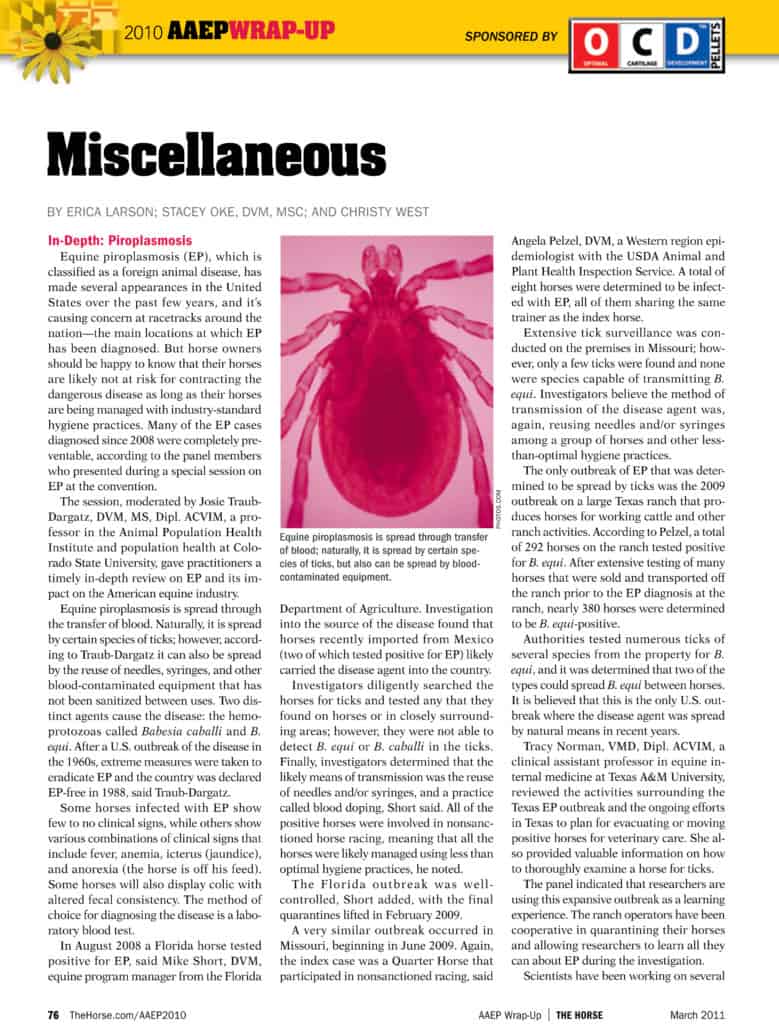Piroplasmosis: Cayenne Tick Ruled Out as T. equi Vector
A team of researchers from Brazil recently determined that the Cayenne tick, which frequents the southern U.S.
A team of researchers from Brazil recently determined that the Cayenne tick, which frequents the southern U.S.
A vaccine against the deadly Hendra virus, developed by a group of Australian scientists, is in the final
The Australian Veterinary Association (AVA) is warning Austalian horse owners to take precautions against the Hendra virus as the season for infections approaches. “There are still lots of gaps in our knowledge about how Hendra virus spreads, and we
With a selection of horse vaccines readily available on local feed store shelves, purchasing a handful for use in your barn might be something you’re considering. But are there equine health risks lurking behind a choice to forgo your veterinarian’s
Ticks are not only unsightly, they also can transmit infectious diseases such as ehrlichiosis, Lyme disease, and piroplasmosis to horses. Severe infestations can cause skin irritations and even anemia (a decrease of healthy red blood cells).
International reports of contagious equine metritis, equine herpesvirus, equine influenza, strangles, equine piroplasmosis, equine arteritis virus, Eastern equine encephalomyelitis, West Nile virus, salmonella, and more.
The number of equine deaths caused by African horse sickness (AHS) in South Africa’s Western Cape has risen to 24, according to a report from the South African-based news website Eye Witness News. Authorities announced March 28 that in the previous

Additional topics discussed during the 2010 American Association of Equine Practitioners convention included piroplasmosis in horses, guttural pouch infection in foals, detomidine sedative and eye pressure, and eye photography to assist case evaluation and treatment.
The soil-borne bacterium Corynebacterium pseudotuberculosis can infect horses and cause a condition commonly known as pigeon fever, in which the infected horses often have pectoral swelling, resembling a pigeon’s breast. Other clinical signs include
All horses competing at the American Quarter Horse Association (AQHA) World Show will now be required to test negative for the tick-borne disease equine piroplasmosis (EP) before being allowed to enter the show grounds. The mandate comes following a
Twelve cases of African horse sickness (AHS) have been confirmed in the Western Cape region of South Africa, according to a report from the South African-based news website Eye Witness News. The cases in the Western Cape follow an outbreak of more
More than 90 cases of African horse sickness (AHS) have been confirmed in South Africa this year and more than 50 horses have succumbed to the disease, according to a report from the South Africa-based news website Cape Times. The outbreak has

What horse owners need to know about piroplasmosis in horses, from Dr. Josie Traub-Dargatz of Colorado State University. (Presented at the 2010 American Association of Equine Practitioners convention)
The University of Kentucky Veterinary Diagnostic Laboratory (VDL), formerly the Livestock Disease Diagnostic Center, recently announced a change in the type of samples required to perform a test for Neorickettsia risticii, the causative organism for Potomac horse fever.
The crooked little bacterium that causes Lyme disease is causing quite a stir in the equine community.

Lyme disease is caused by a spiral-shaped bacterium called Borrelia burgdorferi that is spread to some mammals via the bite of specific hard-bodied ticks. Also known as borreliosis, it is widely considered the most important insect-borne bacterial infection in North America. But it is unknown whether ticks transmit the bacterium to horses and cause disease or because the two coexist.
Stay on top of the most recent Horse Health news with
"*" indicates required fields